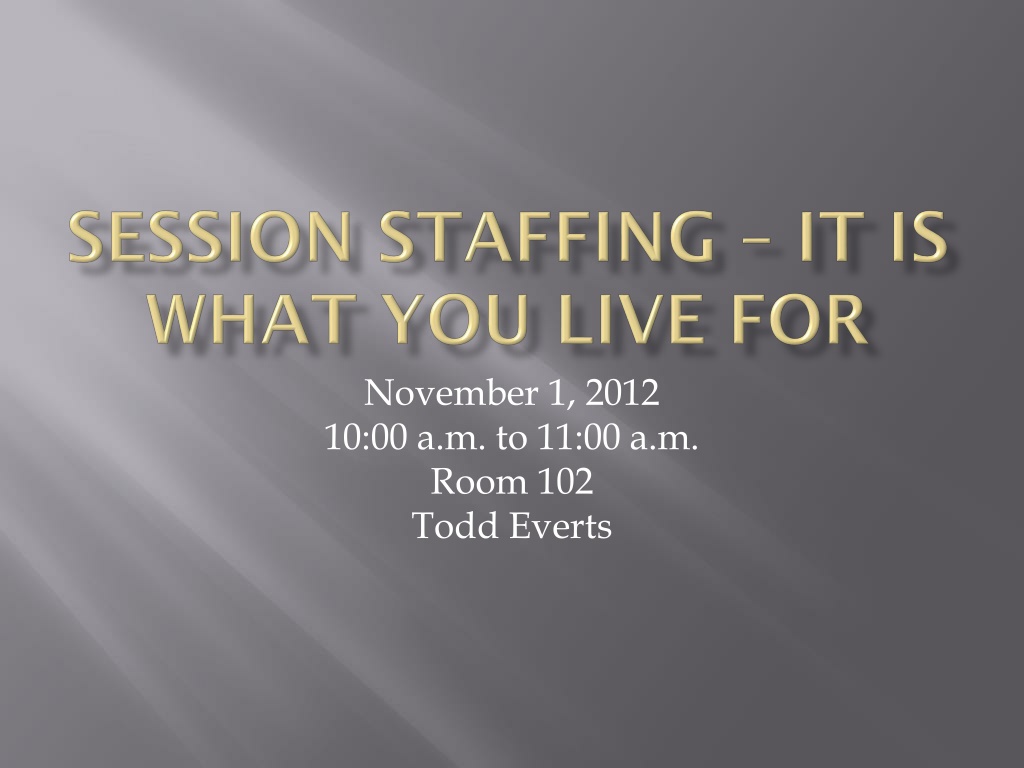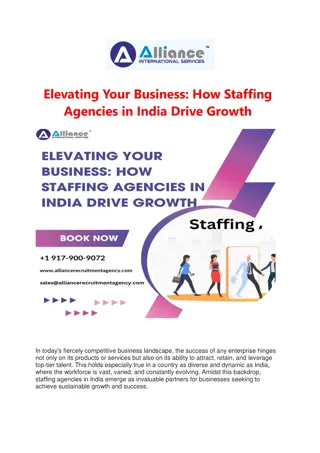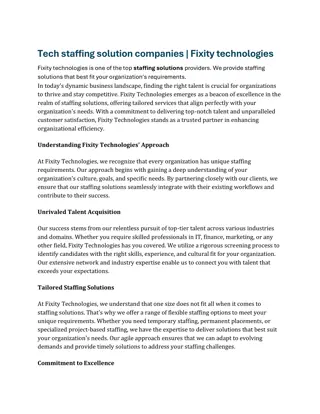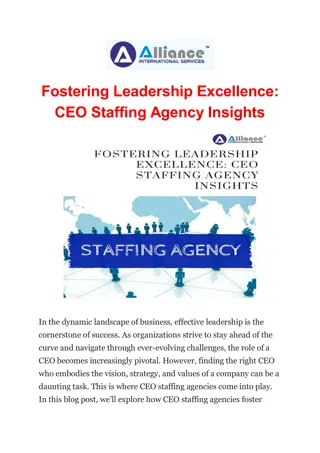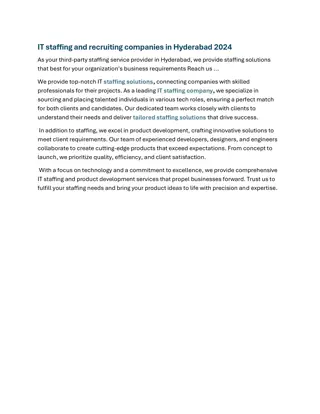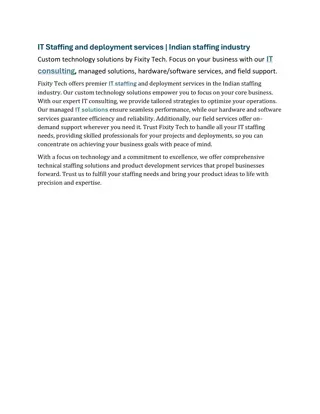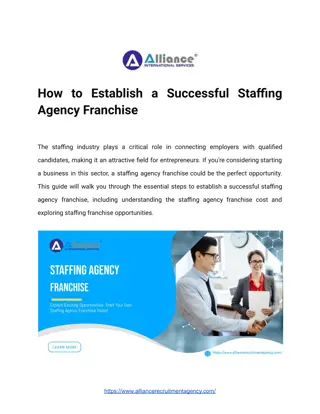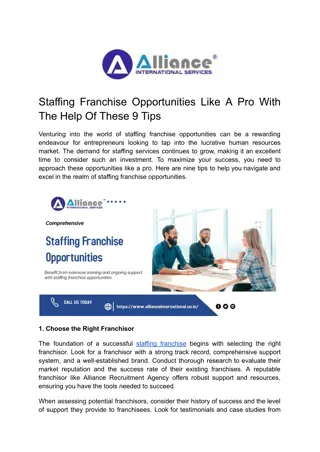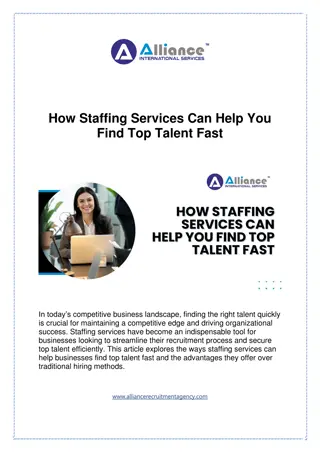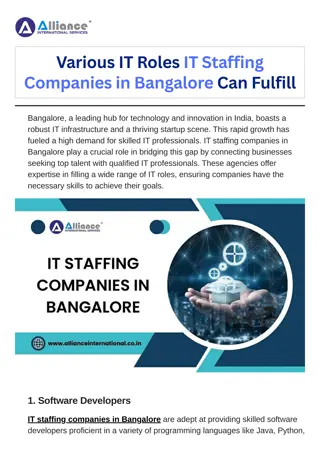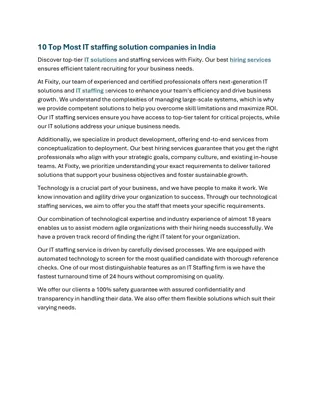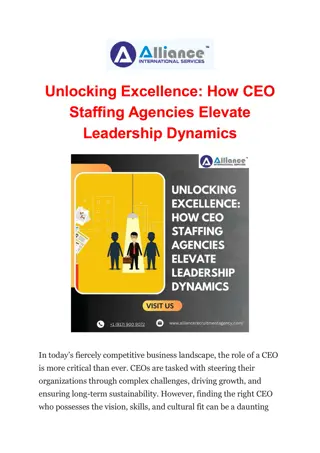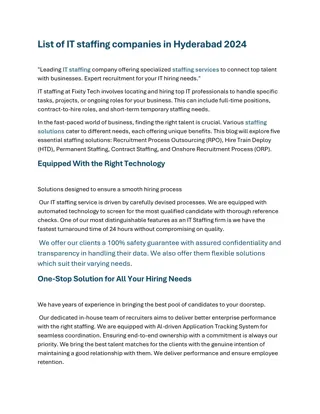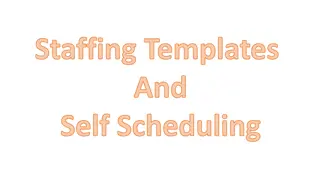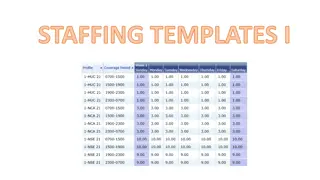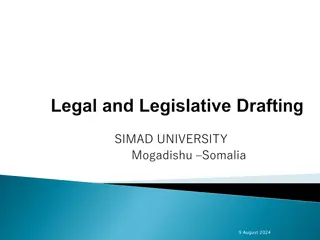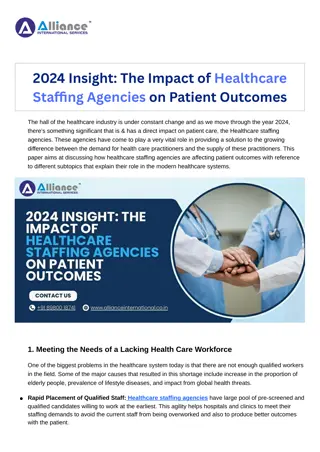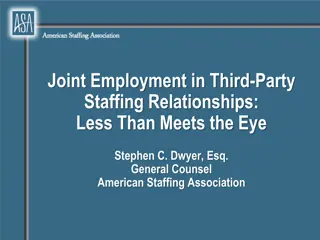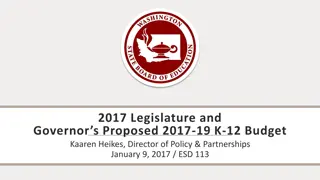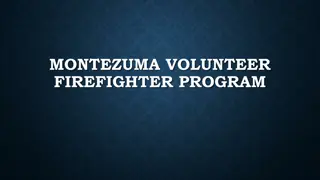Effective Staffing in Legislative Sessions: Key Principles and Tips
Comprehensive training is essential for effective staffing during legislative sessions, focusing on knowledge, trust, and respect. Key factors include in-depth understanding of policy areas, maintaining credibility, and admitting limitations. Trust and respect are earned through fairness, objectivity, and humility. Practical guidance is provided to tackle the dynamic and unpredictable environment of legislative sessions.
Download Presentation

Please find below an Image/Link to download the presentation.
The content on the website is provided AS IS for your information and personal use only. It may not be sold, licensed, or shared on other websites without obtaining consent from the author. Download presentation by click this link. If you encounter any issues during the download, it is possible that the publisher has removed the file from their server.
E N D
Presentation Transcript
November 1, 2012 10:00 a.m. to 11:00 a.m. Room 102 Todd Everts
10:00 May the Force Be With You 10:05 What makes an effective Jedi session staffer? 10:15 Yoda s Wisdom 10:25 What are the duties and tasks of a Jedi session committee staffer? 10:35 What would MacGyver do? -- The tools and tricks of the trade 10:45 Do the walls have ears? Darth Vader could be you. 10:50 Open discussion and questions. 11:00 Argh! and remember . . . Use the Force, Luke!
Legislative session is why we exist. What we do to prepare for and to help the Legislature complete a session is of paramount importance and high visibility. Staffing during the session is not something you do by recipe or by rote. It is an extremely dynamic, unpredictable environment that requires you to be flexible, independent, and creative. However, there are certain tasks, issues, and situations that occur regularly as part of the process. The purpose of this training is to alert you to some of those tasks, issues, and situations and to provide some general guidance.
Obviously, the first thing you need to be an effective staff person is: in-depth knowledge of your policy subject matter areas, and the general legislative processes; and the ability to provide in-depth, thoughtful, and thorough information and analysis as needed. However, no amount of knowledge and ability will make you effective if the legislature does not respect and trust you as an individual and as a professional, which you gain by being: fair, impartial, objective, and discreet; and humble, which means admitting mistakes or (temporary) ignorance.
As you go through this session and as you provide services to the legislature, always keep these two overarching imperatives of effective staffing in mind: Knowledge and ability acquire, expand, and exploit Trust and respect earn and never endanger
Guard Your Credibility With Your Life Your credibility doesn t rest on the depth of your knowledge and your grasp of the issues alone. It rests equally with your objectivity, nonpartisanship, and humility. Always remember: They ll Find Out don t try to bluff your way out of a situation or pretend you know something you don t. They ll find out, and they ll wonder from then on whether you know what you are talking about, even when you do. You Can t Anticipate Everything it is always in your best interest to know as much as you can. However, you can t anticipate every question that will come up, or everything that someone will want to know. You HAVE to admit you don t know and tell them you ll get the information. Unless it s a pattern with you, or you clearly don t know your subject matter, they ll understand. Reduce the Incidence of the Above be prepared.
Learn to Let it Go Any number of factors go into a decision and/or a vote. You may only be aware of a fraction of them. Also, agency people and other lobbyists are there to get their point across. They deserve their day in court and their times with the legislators. Provide information and analysis as needed . However, the ultimate decision belongs to the legislators. Sometimes it will infuriate or frustrate you. Learn to let it go. Keep it Private You are a citizen and an employee and have a right to your opinions, both about decisions made and policy desired, and about personalities (in fact, you d be a very poor citizen if you had a job like this and didn t have opinions). However, you can t compromise your credibility or your integrity. Keep it private. If you want to vent or talk about it, close your door. You won t be trusted otherwise. On a related note, be very careful to whom you vent or with whom you visit. We depend on agency people and others for information. They are often friends. It is tempting to want to alert them to things, or just to share . Use your judgment, but don t say ANYTHING that will compromise your position as staff to the legislature. The agency people understand your role and your position (if they don t understand they need to be enlightened). Talk to your fellow staffers about anything you are unsure or uncomfortable about.
Dont Assume - Its tempting, in times of uncertainty, to assume that the committee meant to do something or must have meant this, etc. Don t assume. Ever. Get clarification and further action if necessary. Rock the Vote - Nothing goes into the bill without a formal vote. Consensus conversations don t count. Get a motion and a vote. Take Notes - Keep copious notes of what the committee discussion entailed, why they are doing what they are doing, the votes, etc. You will need it sometime, either during the session or after. Be Flexible - You need to be organized, not only for the day, but also for the things that will come up during the course of your work. You have to be aware that, while you may think you ve got time to prepare for the next day, anything can happen during the day that will foil those plans. So, think ahead and plan for contingencies. You MUST be prepared for the next day s work. So, give yourself some opportunity for slippage. Go Deep - Often, impacts and outcomes are not readily apparent. Use your broad knowledge of your subject matter areas and state government to anticipate these impacts and act accordingly. Often, very little is what it appears on the surface.
Term limits has changed the dynamics of staffing considerably. A major national study of the impacts of term limits is essentially validating intuition on two major points: Legislators are less knowledgeable, both about the legislative processes, and about the executive branch. Therefore, they will rely on staff and others more for information. Legislators are more distrustful of information and its source, including staff. The discussion that began this portion of the expenditure analysis guide highlighted the two most paramount aspects of this job that place a great responsibility on you and that you must have and maintain: 1) knowledge, and 2) trust. Term limits place an even greater responsibility on you to do the following. Know your stuff and know it from the broad perspective of the legislative process. In the best of circumstances, you are dealing with people whose true expertise lies in whatever business they are in for the rest of the interim. That is why you are here. Term limits places a greater burden on staff to be knowledgeable about all aspects of the legislative and budgeting process and about their agencies due to the loss of institutional memory amongst legislators themselves. Earn their trust and confidence. We have no reason to assume that new legislators will look upon us or the information we give with any more confidence or trust than they look upon the information they will get from all other sources simply because we work for them. We have to earn it with strangers over and over. To gain this trust, legislators must be confident that you: are independent of the agencies and not there to defend them or accept their view without question (the burden to have extensive independent knowledge); can be trusted with confidential information and with their thoughts; are not attempting to influence policy or play legislator; and know your stuff. All of the following are attributes you must have in the job, regardless of the influence of term limits. However, they are especially important now. Very simply: Know the difference between providing options and advice and trying to influence policy. Also, know when to let things go and let them make their decisions. At the same time, be upfront in your analysis and your provision of options. Remember who you work for and why.
